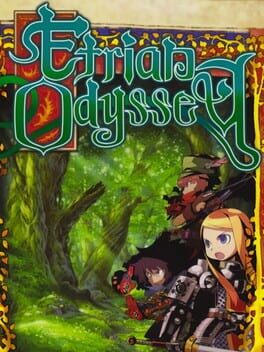The discourse around hard games which had its mainstream nascence at the beginning of the last decade amounts to the rejection of the frictionless experience typified by the aughts-shooter in favor of games which demand mastery, which have a tutelary and transformative effect on the player. Difficulty results from the game's demand that a player acquire a skill: the ability to time out invincibility frames, or recognize patterns in AI behavior, or think a few steps ahead of the consequences of a move.
Wizardry, and the genre of roleplaying game which emerged around it, is completely out of step with this idea. Proving Grounds of the Mad Overlord isn't difficult because of a learning curve, but because it explains very little, punishes failure very harshly, and makes level-grinding a precondition of success. This is not tough-but-fair difficulty, nor does it carry any promise of personal improvement. It's not rewarding. Beyond perhaps a stronger sense of patience, the difference between a player who's started the game and one who's finished is simply the fact of having had the experience.
Etrian Odyssey is not nearly as mechanically sparse as the Wizardry games, or as devoid of opportunities for strategic thinking. It is also much easier and, with a little foreknowledge about good builds and party composition, never demands conscientious grinding. What it carries on is a sense of difficulty which is forbidding rather than disciplinary, which challenges patience rather than skill. Most importantly, it draws the player forward only with the promise of seeing more. It's the first successful effort at Romanticism in a video game, a Getting Over It with Bennett Foddy for those with taste.
The fact that Etrian Odyssey lacks a conventional narrative structure and has a minimum of dialogue belies the importance of the way the game is framed. At no point is the player given a diegetic motivation to proceed, and brief interactions with other characters only emphasize that there's no practical reason to go on and every reason to stop. One's party reaches the end of the labyrinth out of the same determined curiosity which motivates the player, and the fact that the game's been remade as the story of five conventional anime characters saving the world calls to mind Joss Whedon's Stalker.
The game only works because of the incredibly lush world art, the strength of the soundtrack, and the fact that the battle system, while not terribly deep, has enough variety to hold one's interest, and each of these aspects would return in future games in the series. What's special to this game, though, the way it's in conversation with its genre and makes an effort to articulate what that genre's about, isn't something that could really persist in a best-selling JRPG franchise.
I'm also fairly certain this was the first non-eroge Himukai worked on, which is just hysterical to consider. The union of sex perverts and dungeon-crawler perverts which was effected here was the marriage of Isabella and Ferdinand of our times.
Wizardry, and the genre of roleplaying game which emerged around it, is completely out of step with this idea. Proving Grounds of the Mad Overlord isn't difficult because of a learning curve, but because it explains very little, punishes failure very harshly, and makes level-grinding a precondition of success. This is not tough-but-fair difficulty, nor does it carry any promise of personal improvement. It's not rewarding. Beyond perhaps a stronger sense of patience, the difference between a player who's started the game and one who's finished is simply the fact of having had the experience.
Etrian Odyssey is not nearly as mechanically sparse as the Wizardry games, or as devoid of opportunities for strategic thinking. It is also much easier and, with a little foreknowledge about good builds and party composition, never demands conscientious grinding. What it carries on is a sense of difficulty which is forbidding rather than disciplinary, which challenges patience rather than skill. Most importantly, it draws the player forward only with the promise of seeing more. It's the first successful effort at Romanticism in a video game, a Getting Over It with Bennett Foddy for those with taste.
The fact that Etrian Odyssey lacks a conventional narrative structure and has a minimum of dialogue belies the importance of the way the game is framed. At no point is the player given a diegetic motivation to proceed, and brief interactions with other characters only emphasize that there's no practical reason to go on and every reason to stop. One's party reaches the end of the labyrinth out of the same determined curiosity which motivates the player, and the fact that the game's been remade as the story of five conventional anime characters saving the world calls to mind Joss Whedon's Stalker.
The game only works because of the incredibly lush world art, the strength of the soundtrack, and the fact that the battle system, while not terribly deep, has enough variety to hold one's interest, and each of these aspects would return in future games in the series. What's special to this game, though, the way it's in conversation with its genre and makes an effort to articulate what that genre's about, isn't something that could really persist in a best-selling JRPG franchise.
I'm also fairly certain this was the first non-eroge Himukai worked on, which is just hysterical to consider. The union of sex perverts and dungeon-crawler perverts which was effected here was the marriage of Isabella and Ferdinand of our times.
